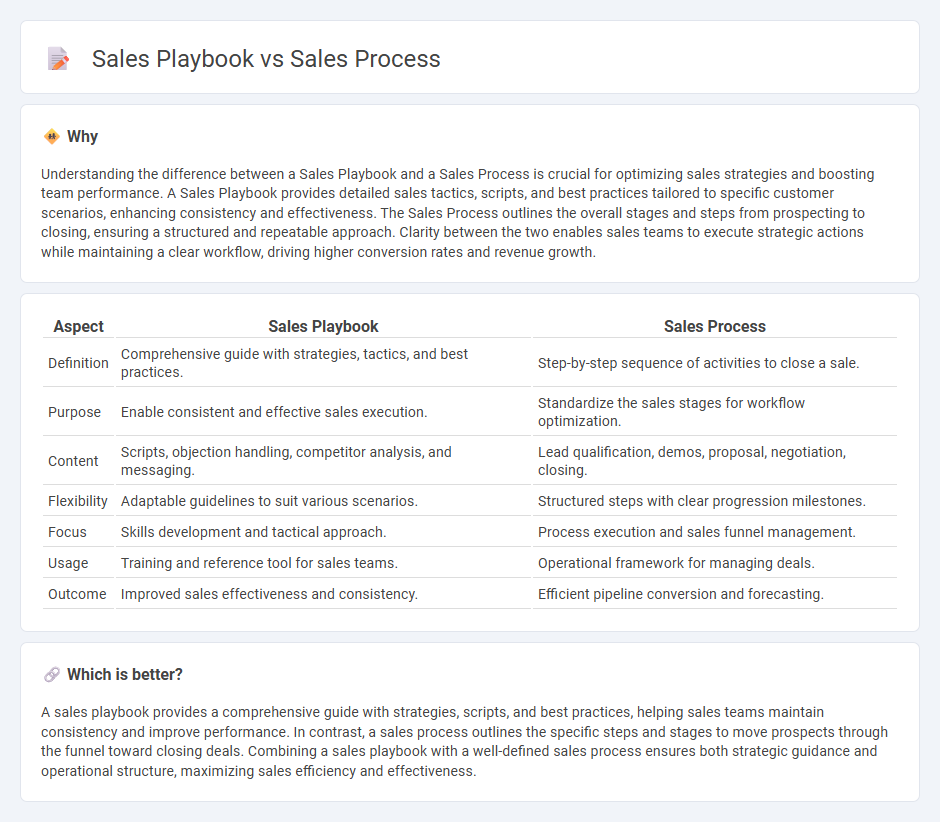
A Sales playbook provides a comprehensive guide with strategies, scripts, and best practices tailored for sales teams to close deals effectively. In contrast, a Sales process outlines the specific, repeatable steps a salesperson follows from lead generation to deal closure, ensuring consistency and efficiency. Explore detailed insights to optimize your sales strategy and boost revenue.
Why it is important
Understanding the difference between a Sales Playbook and a Sales Process is crucial for optimizing sales strategies and boosting team performance. A Sales Playbook provides detailed sales tactics, scripts, and best practices tailored to specific customer scenarios, enhancing consistency and effectiveness. The Sales Process outlines the overall stages and steps from prospecting to closing, ensuring a structured and repeatable approach. Clarity between the two enables sales teams to execute strategic actions while maintaining a clear workflow, driving higher conversion rates and revenue growth.
Comparison Table
| Aspect | Sales Playbook | Sales Process |
|---|---|---|
| Definition | Comprehensive guide with strategies, tactics, and best practices. | Step-by-step sequence of activities to close a sale. |
| Purpose | Enable consistent and effective sales execution. | Standardize the sales stages for workflow optimization. |
| Content | Scripts, objection handling, competitor analysis, and messaging. | Lead qualification, demos, proposal, negotiation, closing. |
| Flexibility | Adaptable guidelines to suit various scenarios. | Structured steps with clear progression milestones. |
| Focus | Skills development and tactical approach. | Process execution and sales funnel management. |
| Usage | Training and reference tool for sales teams. | Operational framework for managing deals. |
| Outcome | Improved sales effectiveness and consistency. | Efficient pipeline conversion and forecasting. |
Which is better?
A sales playbook provides a comprehensive guide with strategies, scripts, and best practices, helping sales teams maintain consistency and improve performance. In contrast, a sales process outlines the specific steps and stages to move prospects through the funnel toward closing deals. Combining a sales playbook with a well-defined sales process ensures both strategic guidance and operational structure, maximizing sales efficiency and effectiveness.
Connection
A sales playbook outlines proven strategies, techniques, and best practices that guide sales teams in engaging prospects and closing deals effectively. The sales process provides the structured stages through which these strategies are applied, from lead generation to final contract signing. Together, the sales playbook and sales process ensure consistent execution, improve team alignment, and enhance overall sales performance.
Key Terms
**Sales process:**
The sales process is a structured sequence of stages guiding prospects from initial contact to closing the deal, emphasizing consistency and efficiency in managing leads. Key stages typically include prospecting, qualification, presentation, handling objections, and closing, designed to improve conversion rates and forecast sales accurately. Discover more about optimizing your sales process to boost revenue and team productivity.
Lead Qualification
Lead qualification in the sales process involves systematically identifying and categorizing potential customers based on criteria like budget, authority, need, and timeline (BANT) to prioritize high-value leads for sales engagement. In contrast, a sales playbook outlines strategic approaches, objection handling techniques, and communication templates tailored to qualify leads effectively within the broader sales framework. Explore our detailed guide to mastering lead qualification through structured sales processes and optimized playbook strategies.
Pipeline Stages
The sales process defines the structured pipeline stages from lead generation to closing deals, ensuring consistent progress through qualification, proposal, negotiation, and finalization. A sales playbook complements this by providing sales teams with detailed strategies, best practices, and messaging tailored for each pipeline stage to maximize conversion rates. Explore how optimizing pipeline stages with a robust sales playbook can accelerate revenue growth and improve forecast accuracy.
Source and External Links
Sales Process: A Complete Guide to Close More Deals - The sales process consists of stages from prospecting and identifying target customers to initiating contact, designed to guide sales reps in nurturing leads and closing deals effectively.
7-Step Sales Process: When to Use It and When to Break It - This outlines a traditional 7-step sales process: prospecting, preparation, approach, presentation, handling objections, closing, and follow-up, emphasizing qualifying prospects and multi-stakeholder engagement.
How to Create a Sales Process That Drives Results - A sales process is a series of repeatable steps from prospecting to closing and nurturing, involving activities such as cold calling, email outreach, research, pitching, objection handling, and referrals to build customer relationships.
 dowidth.com
dowidth.com